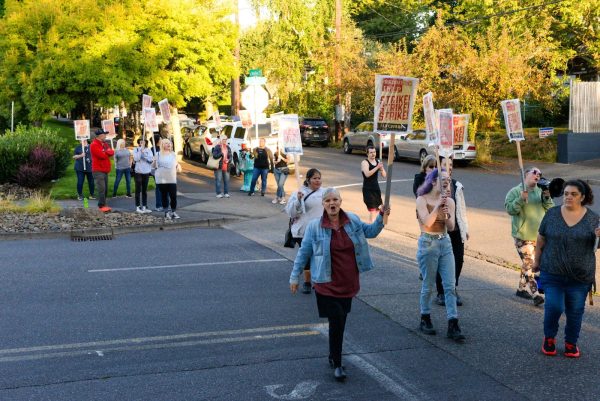
At 6 a.m. on Aug. 28, 2024, at least 4,500 Fred Meyer meat and grocery employees across 28 locations in the Portland metro area put down their nametags and picked up their placards to protest what they claimed were unfair labor practices. Sparked by employees’ growing dissatisfaction with low wages and undesirable working conditions, employees went on strike for seven days, before returning to work at 8 a.m. on the morning of Tuesday, Sept. 3 without settlement. Despite the strike ending, Fred Meyer employees are still encouraging community members to boycott Fred Meyer stores.
The negotiations covered contracts for the meat and produce departments. Kroger, the parent company to Fred Meyer, allegedly refused to provide information that the United Food and Commercial Workers (UFCW) needed for negotiations. UFCW Local 555 has filed a formal charge against Kroger for violating federal labor law by withholding information, stalling negotiations, and misleading the union.
In February of 2024, Kroger proposed a $24.6 million dollar merger with Albertsons. The Federal Trade Commission (FTC) is suing to block this deal, citing antitrust concerns. UFCW claims that as a result of the merger, workers’ wages would be lowered and there would be higher prices for consumers; Kroger argues that the merger would assist them in competing with major retailers. “If the merger is blocked, the only winners will be non-union food retailers such as Walmart, Costco, and Amazon,” shared Kroger in a press release on Aug. 27, which is attributable to Todd Kammeyer, Fred Meyer’s president.
UFCW is hoping for a contract that ensures better wages, and secures health and welfare, as well as strengthens retirement funds. Kroger has refused to meet the union’s demands, with Kroger proposing a gradual wage raise and a ratification bonus of $1,000 to $4,000 depending on years employed. Both of which are contingent on a “no striking” agreement, meaning that employees would need to vote no on striking in order to receive these benefits. After this proposal, UFCW classified it as an unfair labor practice.
Kroger executive Andy Groff stated during FTC testimony that the company raised the cost of milk and eggs beyond levels of inflation. Onalle Michelle McGuire, a utility clerk at Fred Meyer, asks, “The prices of our groceries are going up, so why can’t our wages?”
“What we’re asking for is modest. We’re not asking for anything they can’t afford. They’ve had eight years of record profits, and we’re not trying to hurt the company,” states Andrew Conrad, a cheese specialist at a Fred Meyer located in Southeast Portland. “We just want them to pay a fair living wage, so we can afford the cost of living and not have to worry about paying bills late,” Conrad finishes.
Though employees returned to work, UFCW remains steadfast in their fight for better wages. While employees picketed, they received encouragement from supporters, some via Facebook and Reddit groups, others honked while driving by, and some elderly women even attached the strike signs to their walkers. “I would want Fred Meyer to know that the majority of people empathize more with the workers who are their friends and family, and who serve their community than with them,” McGuire emphasizes. “They’re going to have to make some changes if they don’t want to lose those people’s patronage.”
“Striking strengthened me, as I saw how much support we got from the community. Nobody was crossing the picket line.” Conrad continues, “People were honking their horns and there was support from all the regulars, it was heartwarming and it actually did more for me than anything has in a long time.”
On Sept. 11 and 12, UFCW and Kroger returned to the bargaining tables. But they continued to struggle to come to an agreement. Afterwards, Kroger released the following statement, “We are disappointed in this lack of progress, but we remain committed to reaching a fair and equitable agreement.” As of publication, they are currently scheduling negotiations for a date this fall.
While the strike has transitioned from picket lines and negotiation tables to boycotts and bargaining, the UFCW’s push for better wages and for the resolution of other employee concerns is far from over.


































